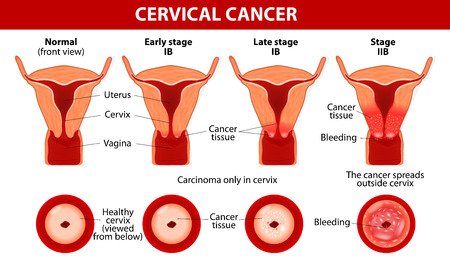
Overview
Vaginal cancer is a rare cancer that forms in the vaginal lining. It primarily affects older women and is often linked to human papillomavirus (HPV) infection. Most cases are secondary (spread from nearby cancers), while primary vaginal cancer is uncommon.
Main types include:
- Squamous cell carcinoma (most common)
- Adenocarcinoma
- Melanoma and sarcoma (rare)
Symptoms
- Vaginal bleeding (especially after intercourse or postmenopause)
- Watery or foul-smelling vaginal discharge
- Pain during intercourse
- Pelvic pain or pressure
- Mass or lump in the vagina
Causes & Risk Factors
- Persistent HPV infection
- Age >60
- History of cervical precancer or cancer
- Smoking
- Immunosuppression
- Diethylstilbestrol (DES) exposure in utero
Diagnosis
- Pelvic exam and speculum inspection
- Pap smear of the vagina
- Biopsy of suspicious lesions
- Imaging (MRI, CT, PET) for staging
Treatment Options
- Surgery (for early-stage or localized lesions)
- Radiation therapy (external and/or brachytherapy)
- Chemoradiation (for advanced or inoperable cases)
- Laser or topical treatments (for vaginal intraepithelial neoplasia)
Prognosis
- Depends on stage and type
- 5-year survival rate:
- Localized: ~70%
- Regional: ~50%
- Distant: <25%
Living with this Cancer Type
- Monitoring for recurrence or HPV lesions
- Management of sexual function and emotional well-being
- Pelvic floor therapy if needed
- Psychological support
Prevention & Screening
- HPV vaccination
- Regular pelvic exams and Pap smears
- Avoid tobacco
- Monitor women exposed to DES in utero
FAQs
Q: Is vaginal cancer related to cervical cancer?
A: Yes, both are linked to HPV and share similar risk factors.
Q: Can it be detected early?
A: Often found during pelvic exams, though early symptoms may be subtle.
Q: Can I still have sex after treatment?
A: Yes, but it may require time, therapy, or support depending on treatment type.
Resources
- Gynecologic Cancer Foundation
- American Cancer Society
- ClinicalTrials.gov
Understand Precision Testing
Learn how liquid biopsy and chemo sensitivity testing can personalize your treatment plan.
Make Informed Decisions
Gain knowledge to actively participate in treatment discussions with your healthcare team.
Improve Treatment Outcomes
Discover how precision medicine and metabolic therapies can enhance treatment effectiveness.
Start Your Educational Journey Today
Empower yourself with knowledge about precision metabolic oncology and take an active role in your cancer care journey.
Need More Information?
Our team of oncology experts is here to help you understand your diagnosis and treatment options.
